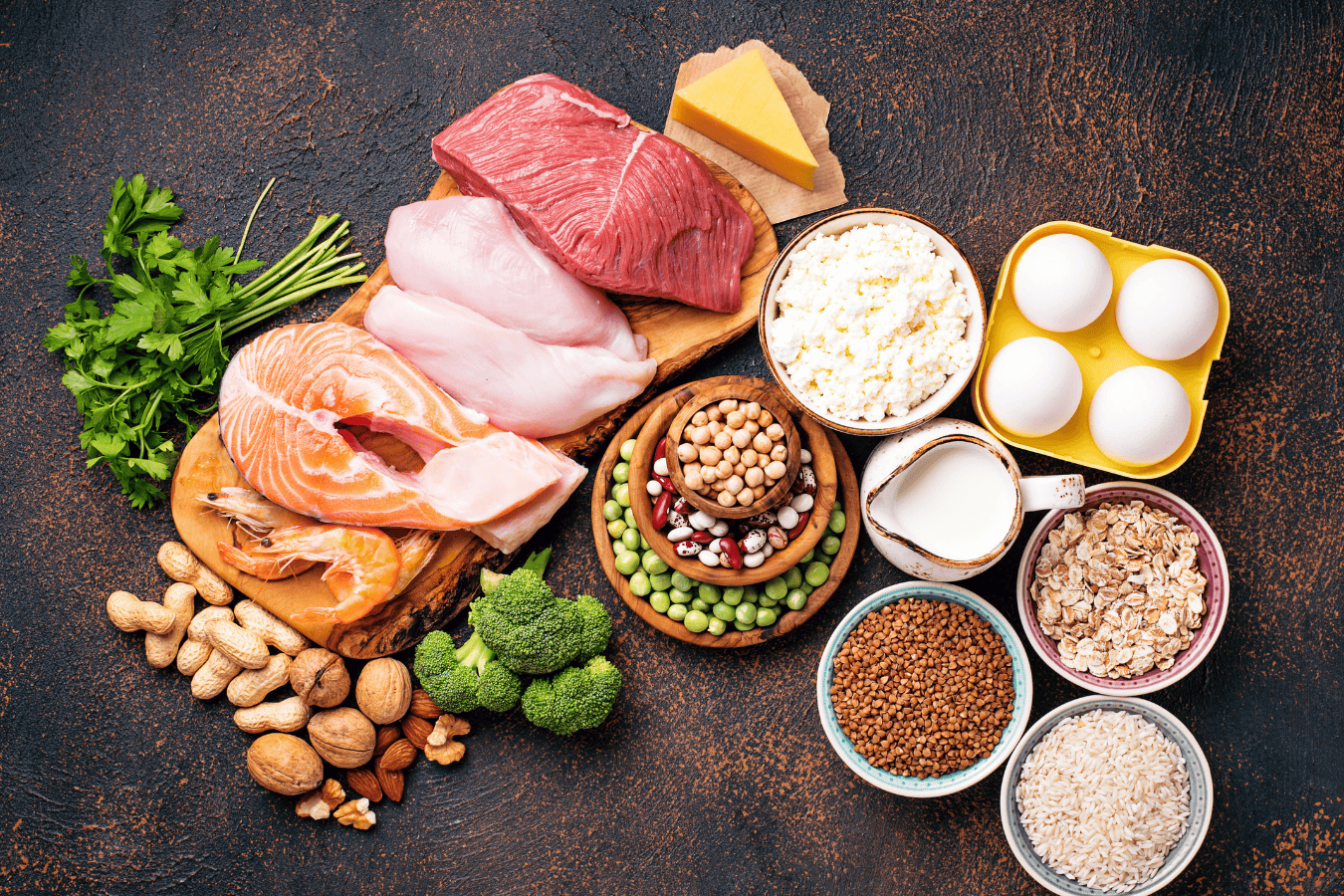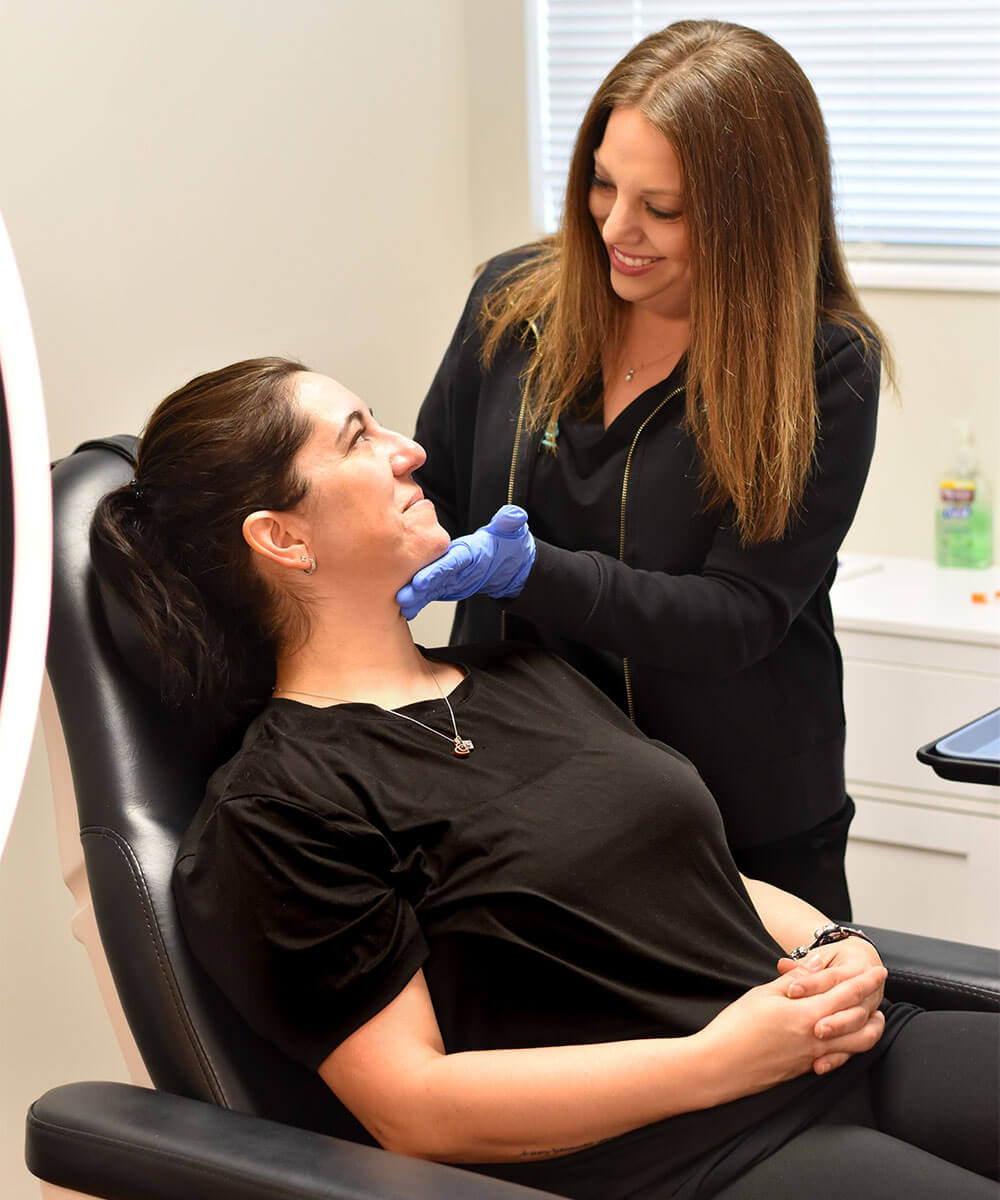
By Lauren Lund, APRN-CNP
Reviewed by Laurianne Scott, DO
Last Updated: 01/26/2025
In recent years, GLP-1 (glucagon-like peptide-1) medications have garnered significant attention for their effectiveness in helping individuals with weight loss. These medications have been shown to suppress appetite, slow gastric emptying, and improve insulin sensitivity, making them a powerful tool in the fight against obesity. However, while GLP-1 medications can help with weight loss, it’s crucial to pay attention to nutrition—particularly protein intake—to ensure that the weight loss process is healthy and sustainable and that muscle mass is preserved or even built. Here’s why protein plays such a critical role when taking GLP-1 weight loss medications and how you can optimize your nutrition for the best results in weight loss and muscle gain.
GLP-1 Medications and Appetite Control
One of the main reasons GLP-1 medications are effective for weight loss is their ability to regulate appetite. By mimicking the action of natural GLP-1 in the body, these medications help curb hunger signals and reduce food intake, making it easier for individuals to create a calorie deficit and lose weight. However, this appetite suppression can also lead to a decrease in overall food intake, which could result in insufficient intake of essential nutrients, especially protein.
Without adequate protein, the body may not have the necessary building blocks to preserve lean muscle mass during weight loss, potentially leading to muscle loss instead of fat loss. This is where the importance of protein becomes especially evident.
Protein Preserves Lean Muscle Mass
When you’re in a calorie deficit (i.e., consuming fewer calories than your body burns), the body doesn’t just burn fat for fuel. It can also break down muscle tissue if protein intake is insufficient. This is a common concern for anyone trying to lose weight, but it becomes even more critical when using GLP-1 medications, which can lead to reduced overall food consumption.
To counteract this, maintaining a high-protein diet while using GLP-1 medications helps prevent muscle breakdown. Protein is essential for muscle repair and growth, and ensuring an adequate intake can help your body preserve lean muscle tissue, which is vital for a healthy metabolism and overall strength.
Protein Supports Muscle Gain
In addition to preserving muscle during weight loss, protein is equally important if you're trying to build muscle. When you engage in resistance training or strength exercises, your muscle fibers experience small tears. Protein helps repair these tears, allowing muscles to grow back stronger and larger.
Many people using GLP-1 medications may find themselves with more energy and motivation to engage in physical activity as their appetite and cravings are more controlled. This could be the perfect opportunity to build lean muscle. However, to see meaningful muscle gains, you need to consume enough protein to support muscle repair and growth.
Does protein help you feel fuller for longer?
Another benefit of protein is its ability to help with satiety, or the feeling of fullness. Protein-rich foods take longer to digest and are more filling than fats and carbohydrates, which can help curb hunger throughout the day. This is especially important for people on GLP-1 medications, who may be eating less overall but still need to make sure their meals are nutrient-dense.
Protein not only helps you feel full but also ensures that you get the most out of the calories you do consume, making it easier to stick to a reduced-calorie diet while still meeting your nutritional needs. This balance helps with both weight loss and muscle preservation.
How Much Protein Should You Eat on GLP-1 Medication?
The exact amount of protein you need will depend on several factors, including your age, activity level, and specific weight loss or muscle gain goals. However, a general guideline is to consume around 1.2 to 2.0 grams of protein per kilogram of body weight per day if you’re actively working to preserve or gain muscle mass. For example, if you weigh 70 kg (154 lbs), you should aim for between 84 and 140 grams of protein per day, depending on your activity level and goals. It’s also important to spread your protein intake throughout the day, as your body can only utilize a certain amount of protein per meal for muscle repair and growth.
Foods High in Protein
When it comes to protein, not all sources are created equal. It's best to focus on high-quality protein sources that are rich in essential amino acids, which are the building blocks of muscle. Here are some excellent protein sources to include in your diet:
- Animal-based proteins: Chicken, turkey, lean beef, fish (salmon, tuna), eggs, and dairy (Greek yogurt, cottage cheese).
- Plant-based proteins: Lentils, chickpeas, quinoa, tofu, tempeh, edamame, and plant-based protein powders (pea, hemp, soy).
- Whey protein: A fast-digesting protein that is particularly beneficial post-workout to support muscle recovery.
Incorporating a variety of protein sources ensures that you're getting a full range of amino acids and nutrients needed for optimal muscle repair and growth.
Do you recommend protein shakes?
Protein shakes can be a helpful for those who struggle to eat enough protein every day from other food sources. You can make your own protein shakes at home using Designs for Health's WheyCool™ or similar products. We recommend the following pre-made protein shakes:
- OWYN™ - Only What You Need Plant Based Protein Shakes. These are gluten free & dairy free plant based protein shakes with all 9 essential amino acids, plus they are low carb & low sugar and contain an excellent source of fiber.
- Ripple Protein Shakes are also a great plant based option.
- Smoothie King also recently came out with a GLP-1 Smoothie Menu which are high in fiber and protein.
- RAW Grass Fed Milk Isolate Protein Shakes have 30g of clean, micro-filtered grass-fed protein isolate with no fillers, dyes, or carrageenans.
Conclusion
While GLP-1 medications are an effective tool for weight loss, they don’t replace the importance of a well-rounded, nutrient-dense diet. Protein plays a crucial role in helping you lose weight in a healthy way while preserving and even building muscle mass. If you’re using GLP-1 medications, make sure to prioritize protein in your diet to help you reach your goals and avoid the loss of lean muscle tissue. Ultimately, protein, along with a balanced diet and regular physical activity, can help you maximize the benefits of GLP-1 medications, helping you achieve a healthier body composition and sustainable weight loss.
If you're unsure how much protein you should be consuming or what sources are best for you, it may be helpful to consult with a healthcare professional or nutritionist. They can help you tailor your diet to ensure you're getting the right balance of nutrients while taking GLP-1 medications.
This article is for educational purposes only. This article is not a substitute for a substitute for medical or health advice from a certified professional who is aware of the facts and circumstances of your individual and personalized situation. Information provided by this article DOES NOT create a practitioner/patient relationship between you and any persons affiliated with this article or website. Always speak with your physician or healthcare professional before taking any medication or nutritional, herbal, or homeopathic supplement, or using any treatment for a health problem. If you have or suspect that you have a medical problem, contact your health care provider promptly. Do not disregard professional medical advice or delay in seeking professional advice because of something you have read on this website.







